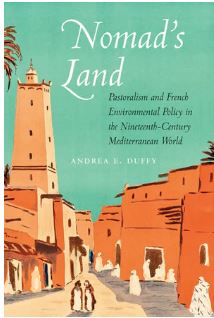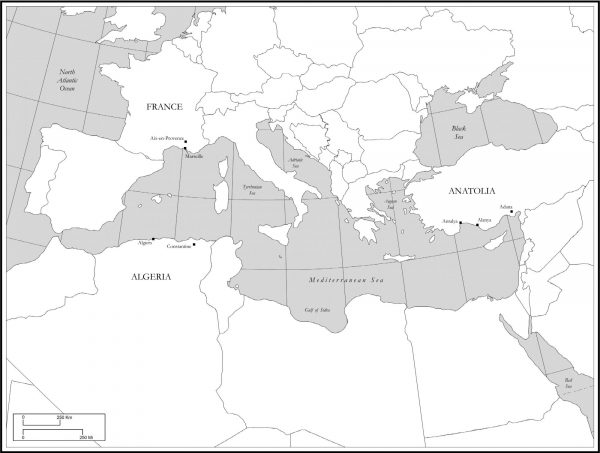At the beginning of the nineteenth century, the Mediterranean world was in many ways a haven for nomads. In the winter months, the sparsely populated coastal plains encircling this inner sea hosted clusters of shepherds who drove their herds into adjacent mountain ranges in the spring. The categorization of these mobile pastoral traditions varied by location – from “tranhumance” in southern France, to “semi-nomadism” in southwestern Anatolia, to “nomadism” in North Africa – but they shared common elements and history. Throughout the early modern period, they lived side-by-side with farmers and played a prominent role in regional agro-pastoral economies.
Over the course of the nineteenth century, however, mobile pastoralism gradually faded from the Mediterranean landscape. Today, the traces of this age-old tradition are buried under sunny beaches, vineyards, and casinos.
 How did this transformation occur? The following is an excerpt from my book, Nomad’s Land: Pastoralism and French Environmental Policy in the Nineteenth-Century Mediterranean World, which investigates mobile pastoralism’s retreat from Mediterranean coastlands in Provence, French colonial Algeria, and Ottoman Anatolia. It exposes the unlikely role of French scientific foresters, whose efforts at conservation had mixed results for Mediterranean forests and spelled ruin for Mediterranean nomads.
How did this transformation occur? The following is an excerpt from my book, Nomad’s Land: Pastoralism and French Environmental Policy in the Nineteenth-Century Mediterranean World, which investigates mobile pastoralism’s retreat from Mediterranean coastlands in Provence, French colonial Algeria, and Ottoman Anatolia. It exposes the unlikely role of French scientific foresters, whose efforts at conservation had mixed results for Mediterranean forests and spelled ruin for Mediterranean nomads.
Reproduced from Nomad’s Land: Pastoralism and French Environmental Policy in the Nineteenth-Century Mediterranean World by Andrea E. Duffy by permission of the University of Nebraska Press. Copyright 2019 by the Board of Regents of the University of Nebraska.
In the early nineteenth century, France quickly became the unofficial leader in Mediterranean scientific forestry, a development that had much to do with its mobile pastoral tradition. France also had deeply rooted connections with the Ottoman Empire, solidified through common enemies and their shared border, the Mediterranean Sea. At the same time, France was home to some of the harshest and most vocal critics of Mediterranean pastoralism. Their view of this practice was directly influenced by gloomy prognoses about the Mediterranean environment. As French forests dwindled in the early nineteenth century, a growing number of French scientists and intellectuals began to warn of deforestation and forest degradation. They regarded the sparse, open woodlands of the Midi with particular concern, and many linked the evolution of this landscape to the ubiquitous presence of sheep and goats. From this angle Mediterranean pastoralism appeared inefficient, environmentally destructive, unsustainable, and a threat to the region’s remaining forest resources. As the century advanced, French arguments against Mediterranean pastoralism came to be increasingly based on developing ideas of environmental conservation and sustainability. Such ideas also grew more widespread, entrenched, and effective in promoting antipastoral policies throughout the Mediterranean world.
The French forest regime’s anxiety over deforestation, its aversion to pastoralism, and its devotion to reforestation led it to exact harsh terms on the inhabitants of Provence. In the name of forest protection the French forest administration fought transhumant pastoralism in Provence in four principal ways: by depriving communities of pastoralism’s profits, by redefining the forest and protected spaces to limit or prevent pastoral use, by shrinking pastureland through afforestation and agricultural expansion, and finally by stepping up surveillance and law enforcement. In the process French foresters encountered substantial and persistent local resistance. The encounters between foresters and pastoralists in Provence played out in a variety of forms, ranging from sometimes violent conflict to compromise and accommodation. Foresters were not the only forces in the battle against mobile pastoralism. Indeed they often benefited from the support of powerful allies who were not necessarily interested in environmental conservation. Such figures ranged from policy makers to industrialists, entrepreneurs, and agriculturalists. For them, mobile pastoralism was either a nuisance or a threat, presenting obstacles and limitations to their private interests. Perhaps most critically, the French forest regime’s antipastoral initiatives gained the support of the central administration, which was motivated by political as well as environmental aims. In the context of Provence the nineteenth-century forest regime greatly expanded state control of Mediterranean pastoral populations. It served as an effective form of centralization, if not internal colonization.
These trends were not unique to Provence. Private interests and state politics played an even greater role in the marginalization of mobile pastoral populations around the inner sea. The French conquest of Algeria that began in 1830 provided new opportunities to mine valuable resources as well as an outlet for settlement, but it also created new tensions and struggles for control of colonization and resources. Within this conflict indigenous pastoralists became a convenient scapegoat, as the colonial community quickly learned to enrich itself and settle disputes by dispossessing nomads, justifying these actions through charges of environmental destruction. By the mid-nineteenth century colonial views had crystallized into an elaborate narrative blaming Arab nomads for the long-term degradation of the Algerian landscape. This narrative served to guide and legitimize colonial policies, including extensive agricultural and land management reforms, ambitious reforestation initiatives, the expropriation of tribal lands, and the overall subjugation of indigenous inhabitants.
During the same period, the Ottoman state began to take note of the development of scientific forestry in other parts the world. In the wake of its defeat by Russia in the Crimean War, which earned the empire the unsolicited distinction of being termed the “sick man of Europe,” and as a result of the spirit of reform characteristic of the Tanzimat era, the Ottoman government was anxious to dispel growing accusations of unchecked deforestation throughout the empire. In 1857 the sultan therefore invited French forest experts to Istanbul to institute and oversee forest administration in the empire. These forest engineers were well aware of the environmental and economic similarities between Anatolia and Provence. Indeed some had personal or professional experience in both contexts. They largely modeled their vision of Ottoman forestry on the example of France. In the process French foresters also gained insight from the Ottoman case. They noted the presence of mobile pastoral tribes within the empire and studied their relationship with forests and the state. As a result, ideas born through the development of scientific forestry in Anatolia began to filter back into France and French colonial Algeria, fueling forest initiatives around the Mediterranean. […]

The words and deeds of forest officials indicate that they truly believed in their cause and assumed that their efforts would serve both the environment and the common good. History and the benefit of hindsight, however, reveal a more complex picture. Beginning in the mid-nineteenth century, alongside the often noisier and more publicized concerns over deforestation, a small but growing body of research developed challenging mainstream perspectives on environmental decline. A few decades later scientists began to reject antipastoral narratives and to defend the practice of Mediterranean mobile pastoralism. Today most specialists agree that France’s nineteenth-century hysteria over deforestation was premature, and they censure early forest agents’ indiscriminate demonization of sheep and goats. Scientists now view mobile pastoralism—when effectively regulated—as an efficient and sustainable use of land in certain environments, including much of the Mediterranean region, and they credit goats with the ability to limit the danger of wildfires in the Mediterranean region’s forests. Such insights cast the nineteenth-century marginalization of mobile pastoralists as a needless and tragic exercise. Yet nineteenth-century French foresters’ environmental alarm did yield important benefits: it ultimately contributed to the development of modern conservationism. If not for these individuals and their effort to preserve and expand the world’s forests, our contemporary environment would be much less green.
About the author
 Dr. Andrea Duffy is the director of international studies at Colorado State University where she teaches courses on globalization, European history, Islamic history, and world history. She is a world environmental historian, and her research examines political, social, cultural, and environmental connections across Europe, North Africa, and the Middle East. She is the author of several articles, and recently completed her book, Nomads’ Land: Pastoralism and French Environmental Policy in the Nineteenth-Century Mediterranean World. In 2019, Duffy served as the director of global studies on the spring voyage of Semester at Sea.
Dr. Andrea Duffy is the director of international studies at Colorado State University where she teaches courses on globalization, European history, Islamic history, and world history. She is a world environmental historian, and her research examines political, social, cultural, and environmental connections across Europe, North Africa, and the Middle East. She is the author of several articles, and recently completed her book, Nomads’ Land: Pastoralism and French Environmental Policy in the Nineteenth-Century Mediterranean World. In 2019, Duffy served as the director of global studies on the spring voyage of Semester at Sea.

